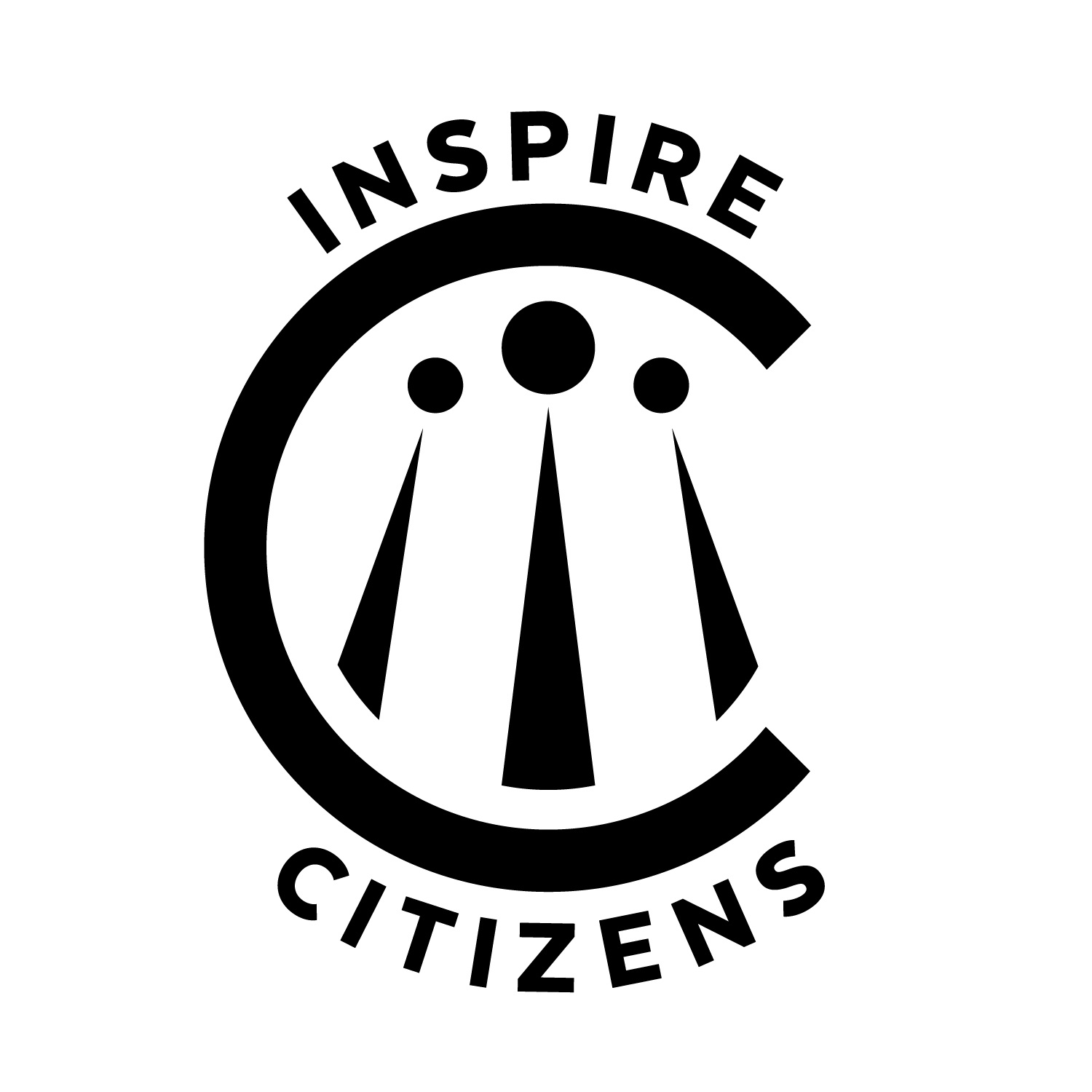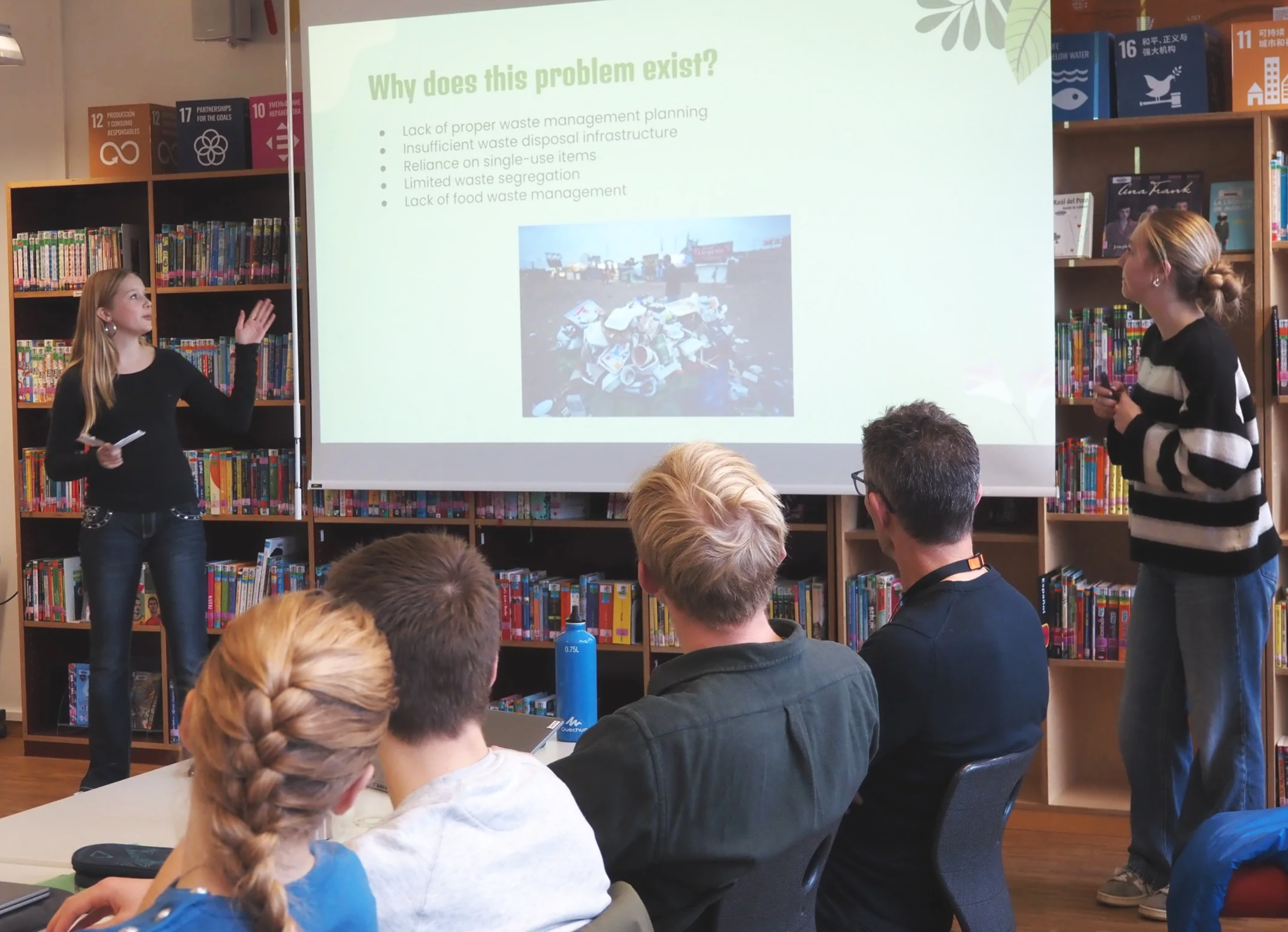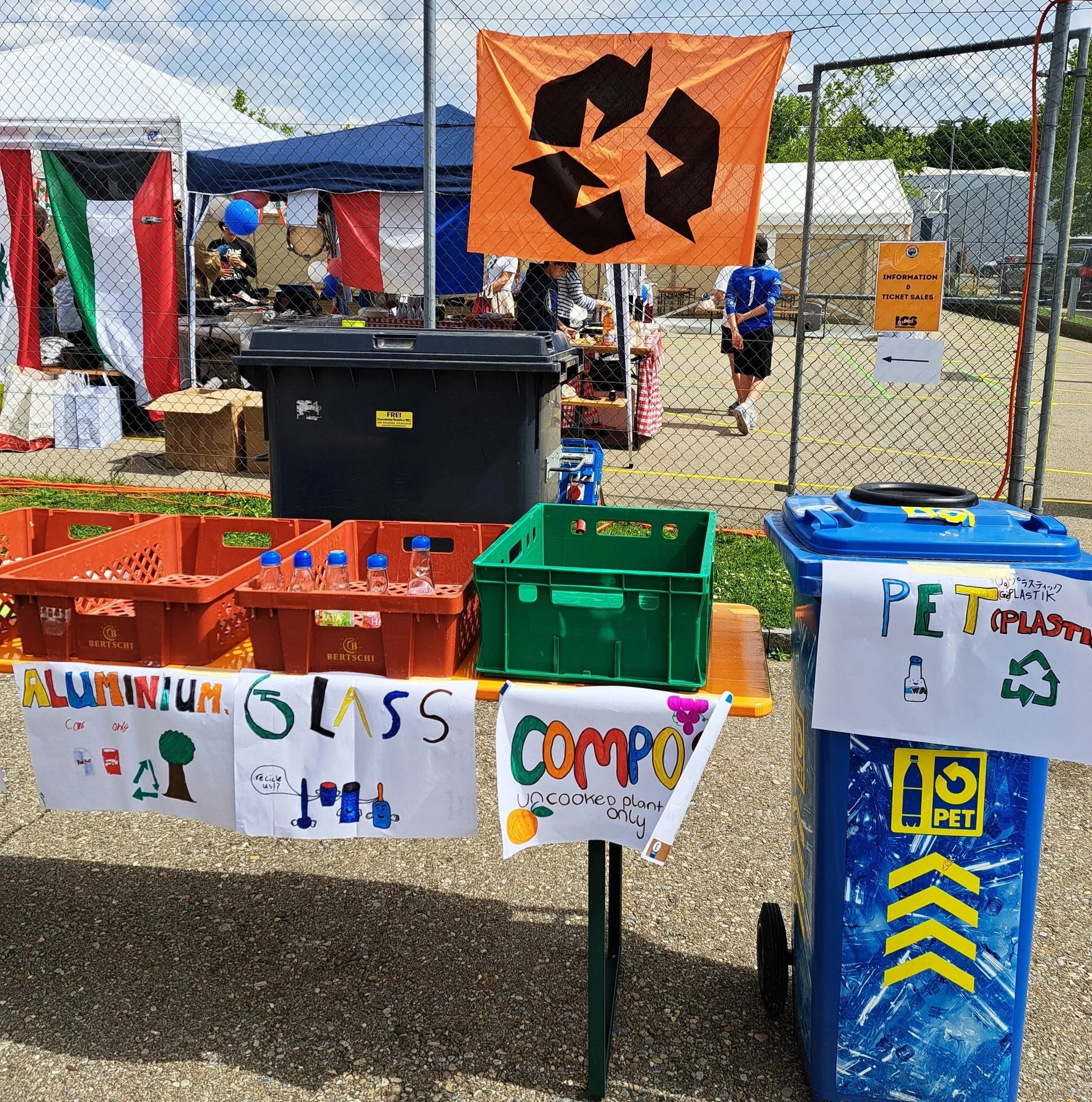From Empathy to Impact: Cultivating Sustainable Changemakers at ICS Zurich
From the perspective of adolescent learners, concepts of environmental sustainability can seem disconnected from the everyday reality of students. out of reach. Michael Dixon, educator and Sustainability Coordinator at the Inter-Community School (ICS) of Zurich, has dedicated a significant amount of effort to changing this perception for his students. Leaning, at times, on a supportive thought partner and capitalizing on a community that promotes empowerment, Michael created a learning experience that reconnects students with the tangible potential for local action. Through a reimagined Grade 10 MYP Individuals and Societies unit, students engaged deeply with sustainability by investigating real-world problems in their immediate school community — and pitching actionable, student-driven solutions.
Students in mid-pitch: Actionable, student-driven solutions to local problems are first linked to global issues of sustainability. (image supplied)
At the heart of the unit lies an intentional shift away from theoretical knowledge toward lived, applied experience. “I always get really frustrated with the knowledge that our students gain when it comes to things like climate change, sustainability, resource extraction,” says Michael. “They can say a lot about this, but especially with certain perceived academic pressures, there's often a gap with action.”
This gap became a point of transformation — sparked in part by early visits from Inspire Citizens co-founders Aaron Moniz and Steve Sostak. Michael recalls, “We knew we had this Grade 10 unit which looked at sustainability quite loosely… and the idea was to try and change it so we can hone it into what’s now called community engagement.”
How to Identify Community Partners
What emerged was a unit driven by localized action and grounded in the Inspire Citizens Empathy to Impact framework. Through Aaron’s support, Michael and his colleagues mapped their community assets and discovered new potential in an often-overlooked partner: the Parents’ Association (PA). “If you harness the PA,” Michael shares, “they’re a great community asset.”
Product deconstruction is what educator Michael Dixon identifies as the flashpoint for student engagement with sustainability issues. This driver of student inquiry is exceedingly practical as students strive to map out the origins of materials found ensconced within our everyday objects. (image supplied)
Students began with product deconstruction, taking apart donated items — including laptops — to examine global footprints of consumption. This tactile experience ignited a personal connection to sustainability issues and set the stage for deeper inquiry. Students then investigated key sustainability challenges across the school and pitched their solutions to a panel including the head of school, division principals, and the PA.
The student proposals were rooted in practical, community-based change. “The winning solution was… essentially a depot system,” Michael explains, “where instead of having disposable plates and cups at school events, you would have proper recycling centers and reusable items.” The students didn’t stop at ideas — they built a pitch including logistics, costs, and even safety considerations like the potential for microplastics consumption.
The immense educational value behind this cheerful little reusable cup came in the form of real-world logistical challenges for students to play a role in alongside their Parent Association partners. The net benefits were also measurable in the considerable amount of waste reduction that was tracked during the school’s International Festival.
The result was an impressive real-world pilot at the school’s International Festival — featuring reusable cups designed by students, recycling hubs, and a measurable reduction in waste. “Of the cups we ordered, roughly 450 were used,” Michael reports. “That's 450 throwaway cups that weren’t used… and we reduced our trash from about six 800-litre bins to just four.”
Experiencing the Imperfect Nature of the Real World
The learning extended far beyond grades. “What I really liked about it,” Michael reflects, “is what they reflected on in the end — that there are so many different steps and troughs and peaks along the way.”
Students experienced the unpredictable, often imperfect nature of real-world action, from delivery delays to the logistical challenges of washing and reuse. Yet they persisted, adapted, and found success.
Perhaps most powerfully, this unit created a ripple effect. The PA adopted some of the proposed changes and initiated sustainability efforts of their own. Two students were selected as Villars Institute Fellows, joining a cohort tasked with driving student-led sustainability initiatives in the years ahead. “We now have a team of six fellows whose job it is to try and drive student action– and make this unit better,” explains Michael. Affiliation with The Villars Institute is significant as the organization’s key aims include the promotion of systemic change through the engagement of youth interested in accelerating the transition to a net-zero economy and restoration of planetary health for all.
A student-designed capture station was clearly visible during an annual festival hosted at the school. (image supplied)
Michael situates this learning within Hart’s Ladder of Participation, striving to shift students toward the top rungs — where they initiate and lead with adult support. “At the lower levels, it requires more teacher handholding,” he explains. “But I think this age is perfect. They're mature enough to lead something — and they're not yet swamped by the pressures of the diploma.”
Drawing Support from the Inspire Citizens Connection
Aaron’s role in supporting this transformation was both foundational and sustained. Michael shares, “Aaron gave me some ideas about how best to connect it… made something very complex feel quite straightforward,.” Far from being a lengthy drawn out process, the unit outline was developed in a design sprint. “We sat down… and within 30 minutes, we had the unit,” Michael recalls. Using the Empathy to Impact framework and whiteboarding sessions, Aaron helped translate ideas into action.
Michael also appreciated the balance of autonomy and support. “I didn’t necessarily engage [with Aaron] more because I knew he was coming back,” he says. “When he returned, it was like, okay, here’s where we are now. What do you think’s next?”
Inspire Citizens’ role wasn’t just about frameworks — it was about shifting mindsets and building educator confidence. “Just to direct you towards a resource, or an idea, or a reflection… that’s all you need sometimes to get out of a rut.”
Sustaining the Momentum
Looking ahead, the team at ICS Zurich is aligning this unit with the school’s evolving Eco-Schools focus — adapting the project theme to match cycles on waste, biodiversity, or water. “We achieved the Green Flag this year,” Michael proudly shares. “And this unit contributed quite a lot to that recognition.”
His advice for other educators? Start with community asset mapping. “We have so many parents who are professors or work in sustainability. Leaning on that — don’t be afraid to do it.” And perhaps most importantly: “Have the courage to go and do it.”




